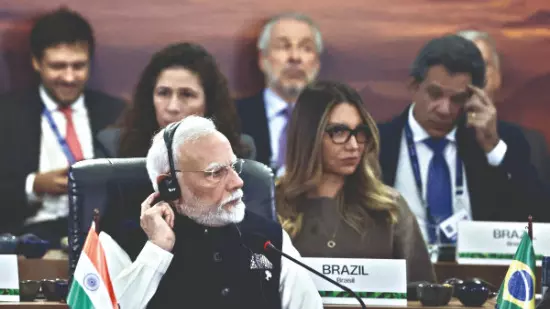From ‘weak link’ to ‘rule-shaper’: India redefines BRICS at Rio Summit

New Delhi: The BRICS Rio Declaration of 2025, which was released following the summit in the seaside city of Brazil, marks a sea change for the group. The story behind this proclamation is India’s transformative journey via BRICS, even though the group’s call for institutional reforms—from the UN Security Council to the Bretton Woods institutions—reflects its historic critique of an ageing global order.
One example of how domestic regeneration may change a nation’s external impact is India’s rise under Prime Minister Narendra Modi, from being classified as the clique’s “weakest link” ten years ago to setting its agenda now. There was scepticism when India joined BRICS in 2013, according to reports.
Troubled by slow growth, a weak fiscal situation, and declining investor confidence, the nation was classified among the “Fragile Five” economies.
According to statistics, it’s 5.5 per cent GDP growth lagging behind the rest of all BRICS members, and there were threats of sovereign rating downgrades.
International commentators questioned whether India deserved its seat at the table, with some even suggesting Indonesia replace it as the “I” in the acronym.
The contrast with India now could not be starker.
Over the past decade, India has emerged as the fastest-growing major economy, outpacing all BRICS peers in 2024-25 with 6.5 per cent growth, data underlines. Industrial growth, fiscal prudence, and structural changes have put macroeconomic fundamentals to rights, winning accolades from institutions such as the IMF and international finance titans like Morgan Stanley.
This reversal is not statistical alone; it has reset India’s strategic weight. From being a passive actor in BRICS, India now leads its transformation from intangible financial cooperation to tangible, inclusive paradigms. Discussing India’s assertive footprint, the current Modi government has witnessed India shift from being a rule-taker to a rule-shaper in BRICS, according to experts.
Previous versions of the grouping had focused on general themes such as multilateral reform, but the priorities of India—counter-terrorism, digital innovation, and entrepreneurship—were not given attention. This shifted decisively post-2014.
Modi’s India institutionalised counter-terrorism through the BRICS ‘Counter-Terrorism Working Group’ and an official Action Plan put in place during India’s 2021 presidency.
These mechanisms, focusing on intelligence-sharing and financial controls, elevated BRICS from a platform of rhetorical denunciations to one with functional tools—a turn falling in line with India’s security needs, especially after the most lethal terror attack in Kashmir valley’s Pahalgam on April 22 this year.
Just as revolutionary has been India’s effort to weave technology and entrepreneurship into the BRICS’ fabric. The establishment of the BRICS Startup Forum, launched under India’s presidency, demonstrates PM Modi’s vision for harnessing youth-led innovation for economic energy.



